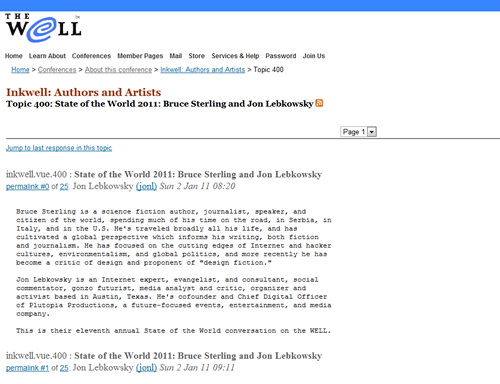In our first blog about other venues where people discuss virtual worlds, we talked about Quora. While Quora is very new, The WELL is almost ancient:
The WELL is a cherished and acclaimed destination for conversation and discussion. It is widely known as the primordial ooze where the online community movement was born — where Howard Rheingold first coined the term “virtual community.” Since long before the public Internet was unleashed, it has quietly captivated some accomplished and imaginative people. Over the last two and a half decades, it’s been described as “the world’s most influential online community” in a Wired Magazine cover story, and ” the Park Place of email addresses” by John Perry Barlow. It’s won Dvorak and Webby Awards, inspired songs and novels, and almost invisibly influences modern culture.
In 2010, this social site celebrates its 25th birthday online. A wide variety of topics are being discussed in ‘conferences’. The ‘Virtual Communities’ conference has among its topics ‘Second Life: The World-Building MMOG’, but I don’t think there is a topic ‘blue mars’ or ‘opensim’ (search did not yield results).
The conversations are very instructive and friendly. Just like for the Quora discussions people are supposed to use their real names. There are moderators, ‘conference hosts’. However, there are also major differences between the two services.
Those differences boil down to this: The Well wants to be a walled garden. As they explain themselves: “Membership is not for everyone, partly because we are non-anonymous here.” One cannot vote a question or an answer up or down. There are no ‘follow’ buttons next to the names of the participants. In fact, you own your own words, meaning that you are responsible for them but also that others cannot simply copy paste them outside The WELL. Before quoting or even mentioning that another person is a member, one should ask that other person whether she agrees.
Another major aspect of the “walled garden”: membership is not free.
There are about 3.000 members now, and to be honest, I don’t think the community, owned by Salon.com, can boast tremendous growth figures.
In fact, The WELL is rather fascinating. Because of its history but also because of this non-viral approach of a members only gathering. Whether it will be able to survive, faced with competition such as Quora, is another matter. Quora uses real identities, but provides connections with Twitter and Facebook, is free, and for now manages to maintain good quality using a voting system. The WELL however is a bunch of micro-communities (around the conferences) where more intimate relationships can develop.
Sterling and Lebkowsky

To be fair, The WELL is not completely a walled garden. Non-members can for instance join the ‘Inkwell: Authors and Artists’ conference. Author Bruce Sterling and internet&cyberculture expert Jon Lebkowsky discuss this week State of the World 2011.
The organizers even run a wild experiment: a Facebook event page for feedback (great discussion there) and the ever cunning Lebkwoski announced on that page a Twitter hashtag (#sotw2011)!

